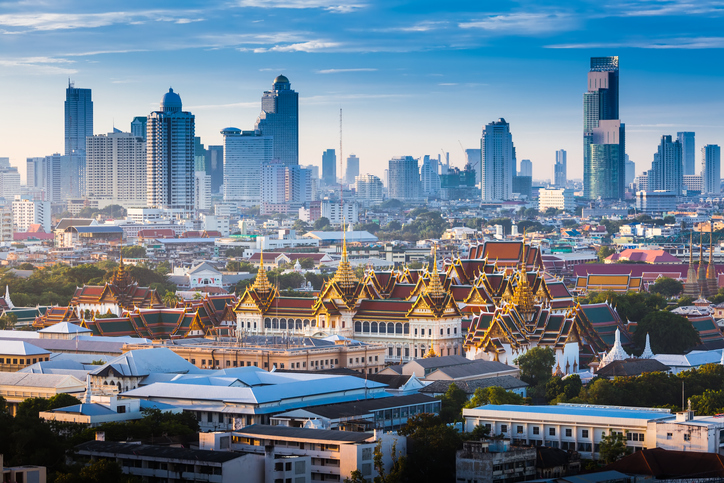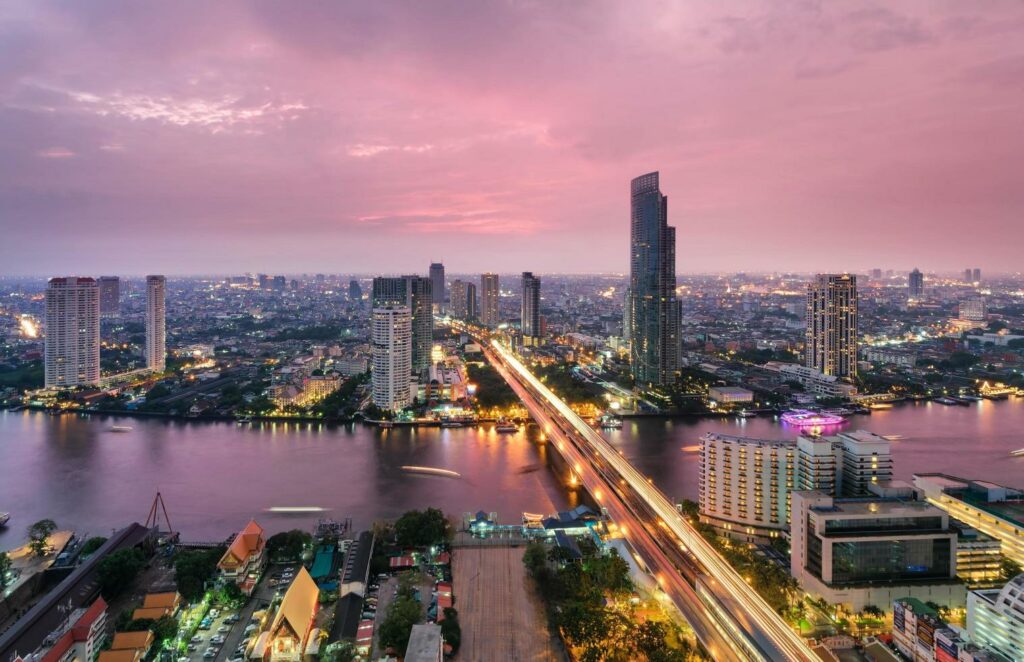Expat Visas in Thailand – What’s The Updated Situation in 2021 – that will be the topic of today’s article.
Before introducing this article, if you are interested in our core services which are expat financial, insurance and mortgages, you can contact me here.
The best time to consider your financial situation is when you are moving to a new country.
Introduction

When you’re moving to Thailand, getting a visa can be confusing. Looking online without navigating to the right platform can even worsen the situation. Here, our teams of experts have put together a guide on the visa you’ll need while relocating to Thailand and the information needed to get hold of one.
Thailand is a beautiful country in tropical climes with different wonders, making it known as the Land of Smiles. They have a fascinating history, unique cultures, and it’s among the country that the Europeans have never colonized. This way, great past leaders have encouraged Thai people to have a sense of pride.
Added to this, the culture of Thailand’s Buddhism also instills incredible generosity and giving, coupled with a strongly hierarchical and spiritual connection. So, being an expat in this country is a good thing. Meanwhile, many foreigners will choose to return again and again if they found any language barrier or other factors.
Also, the expat community has grown, and the Thailand community is now the best destination. However, there are strict visas procedures to follow. Due to the Covid-19 outbreak, the country has banned some expats because of their home country. Would you love to know more about a Thai visa? Read more!
Typically, we have compiled this article to explain more about Thailand visa requirements and the updated situation in 2021. To add to that, we will walk you through the consequences of visa overstay, cancellation of visa on arrival, frequently asked questions, and many other concepts, to mention a few.
Covid-19 Guide for Thailand Travelers in 2021
Aside from the updated situation for travelers on visa requirements, knowing the 2021 guide is relatively essential. If you’re traveling to Thailand, it would be better to visit the Department of Disease Control and the Ministry of Public Health to find Thailand advisories and other helpful information.
For general travel information, you can visit the WHO global travel guide and the recommendation you’ll need to hasten your relocation process. Moreover, we would like you to consider the following before traveling to Thailand today.
- Ensure that you have the latest information on areas or cities where COVID-19 is spreading. You can also check the country’s coronavirus reports for more information
- Please check your choice of city’s restrictions, websites of the health ministry, and the ban protocols as they can change quickly and are determined by the national government
- If you consider traveling to an affected area, you should talk about the risks of COVID-19. For example, you can talk to your healthcare providers or local public health authority before your departure
- Ensure you have a travel bag-mask and a small bottle of alcohol-based sanitizer. This can facilitate regular hand-washing.
- And lastly, ensure you have an adequate medical insurance cover
Getting To Thailand during Covid-19 Outbreak

Whether you’re planning your reunion or your escape, we need to guide you through the process of traveling safely to Thailand. According to the Royal Thai Government’s Immigration Burea, non-Thai nationals can visit the embassy to request an additional extension of stay in Thailand.
However, anyone getting to Thailand must obtain a certificate of entry from their local Thai embassy or consulate. Besides, your application will need to be submitted ten working days before the intended date of travel. Other requirements may differ between groups of eligible travelers, including non-Thai nationals.
What to Know While Traveling To Thailand
- Airport and ground travel can often be populated. So, we advise you to wash your hands regularly and, if possible, stay one meter away from each other
- Ensure you know what to do and who to call whenever you’re feeling ill while traveling
- Make sure you comply with instructions from local authorities where you’re traveling, and provide the necessary details, including travel information, and complying with local restrictions
What to Know When You Return From Traveling
- When you return from a Covid-19 affected country, the first thing you need to do is to monitor yourself for Covid-19 symptoms for the slated fourteen days, including taking your temperature twice a day
- If you noticed that you’re having a mild cough or low-grade fever, it would be better to stay at home and self-isolate. In addition, you may need to avoid close contact with other people, including your family members, explaining to them the details of your recent travel and symptoms
- Find helpful information to protect yourself, check the Covid-19 situation updates in Thailand, and the daily reports
Types of Thailand Visas (2021)
As we all know, Thailand is a beautiful country; it also offers many tourist spots and is rising to be one of the most sought-after tourist destinations in the Asia-Pacific region. However, there are many types of visas applicable for any legal entry to the country.
Again, Thailand is one of the best destinations for an expat to retire, conduct business, or even work to enjoy your life. But before all of that, you must clearly understand the country’s visa types, laws, and regulations about Thailand’s immigration.
In general, a foreign citizen who chooses to enter Thailand’s kingdom must obtain a visa from the Royal Thai Embassy or Thai Consulate-General in the country. However, certain countries do not require a visa if they meet the visa exemption rules and regulations.
Further, such nationals would be allowed to stay in the country for not exceeding thirty days and can be renewed for another 30 days afterward. As of today, there are quite a few categories of visas to choose from in Thailand, depending on your relocation purpose. These visa types entitle you to different rights concerning your length of stay in Thailand. Meanwhile, the duration of stay, the purpose of the visit, and other considerations depend on your nationality. Below are the types of visas to choose from in Thailand.

Visa-on-Arrival (Stamp) Type
The visa-on-arrival type is quite different from other kinds of visas. It is a visa exemption type that allows foreigners to stay for at least 30 days and extend the stay based on the immigration officer’s discretion at the immigration office. This kind of visa only allows some set of people to visit the country.
Tourist Visa Type
The tourist kind of visa has a validity that ranges from two months to three months, depending on the number of entries you make across the land border or from the airport. Furthermore, if you arrive in Thailand through an international airport, your document will be stamped for a 30 or 60 days permission of stay, depending on your country’s visa exemption agreement with Thailand.
Examples include giving a tourist visa application from Laos for about 60 days tourist visa to Thailand.
Non-Immigrant B Visa Type
This type of visa in Thailand is one of the most common and sought-after visa types in the country. This kind of visa is classified into three different categories, including Non-B Work, Non-B Teaching, and Non-B Business. Let’s quickly take a look at the concept one after the other.
Non-Immigrant B Type (Work) – This type of visa is meant for working in a corporation, business entity, and company.
Non-Immigration B Type (Teaching) – This type of visa is meant for those working as school teachers below the university level.
Non-Immigration B Type (Business) – This type of visa is meant for those who wish to conduct business or establish a company in Thailand.
Non-Immigrant O Visa
This type of visa is classified into four different categories, which are the NON-O Dependent, NON-O spouse/marriage visa, NON-O retirement, and NON-O guardian application. Without further ado, let’s take a look at the types of Non-immigrant O visa.
Non-Immigrant O Dependent Type – This non-immigrant type of visa is issued to the immediate family of non-immigrant B Visa holders
Non-Immigrant O Spouse Type – This kind of visa is issued to someone that got married to a Thai national
Non-Immigrant O Retirement Type – As the name implies, this visa is issued to emigrants above fifty years of age and intend to retire in Thailand. However, there are specific qualifications you’ll need to pass before this visa is granted.
Non-immigrant O Guardian Type – This type of visa is suitable for children below 18 years old and still studying in Thailand.
Non-Immigrant ED Visa Type
This type of non-immigrant visas is meant for those who are studying in Thailand. The duration of their courses may be short-term or long-term, but they must secure a non-immigrant ED. Meanwhile, the process and documentation should be taken care of by the school, center, or university.
Thai Wife Visa Type
Acquiring a marriage visa in Thailand is quite a straightforward process. Also, it involves a lot of verification and authentication of some documents and approval of some government offices. This type of visa, in the long run, can be obtained if a person is married to a citizen of Thailand.
Education Visa in Thailand
If you plan to study and take a short course program in Thailand or pursue a degree program, this is the right choice of visa application. Thailand law firm assists with acquiring this kind of visa. So, if you’d love to study in Thailand, an education visa is the right choice for your stay.
Traveling To Thailand in 2021
There are new updates regarding the Thailand immigration PROCESS. During the COVID-19 pandemic, many measures have been enforced to prevent and control COVID-19 from spreading in the country. This includes measures to keep an influx of visitors and how they enter the country.
Therefore, foreign visitors who need to visit Thailand must comply with the measures. In addition to this, we have compiled the five easy steps to take. Now, let’s explain some of the concepts below.
Check Your Eligibility –First Step
When you’re traveling to Thailand for the first time, you must start your travel plan by checking your eligibility. On this part, you must know whether you fall in the category of eligible countries or not. In a phrase, we can say that Thailand is open for travelers but have specific rules and regulations.
Applying For a Visa – Second Step
Do you want to stay in Thailand for more than 10 to 20 years, it would be better to consider the Thai Elite program. Although there are different kinds of visas to apply but you can refer to the types of visas mentioned above for more information. Also, you can check thaiembassydotcom to understand better.
Book a Flight and COVID-19 Insurance
The main requirements for the Thai visa application and the COE application are the COVID-19 travel insurance, Semi-commercial flight allowed to enter Thailand, and many others, to mention a few. Certain airlines such as the Qatar Emirates and other airlines are permitted to operate but booking the right flight to Thailand could help your relocation process.
Apply For Thailand Certificate of Entry
As a foreigner, applying for a Thailand certificate of entry allow for an easy boarding procedure in Thailand. The embassy will screen your details and approve your application process to know whether you meet the requirement or not.
Obtain COVID-19 Test and Prepare Your Documents
At the embassy or airport, obtaining a Covid-19 test is quite essential. Also, make sure you’re ready to present your certificate of entry, valid visa in your passport, declaration form, medical certificate, copy of confirmed ASQ hotel booking, flight reservation, and vaccination certificate for traveling quickly.
Best Ways to Relocate To Thailand in 2021
In order to relocate to Thailand in 2021, you’ll need a letter of approval from the Thai Ministry of Labor. Many people use this route if there is trying to get a visa based on work-on-approval. However, there are many ways to relocate to the country. Without further ado, let’s take a look at the guide.
Permanent Residency in Thailand
Permanent residence always seems to be the best way to relocate to Thailand. In other news, it can be not easy to obtain. If you’re planning to get a Thailand permanent residency, you must be able to fulfill the following requirements. At first, you must hold a non-immigrant visa for at least three years. Also, they’ll need to fall under the investment category, work/business, support a family that holds one residency.
Citizenship or Naturalization in Thailand
Thai citizenship is obtainable if you’ve been living and working in Thailand for at least three years. For an added advantage, it’s pretty okay to speak the Thai language fluently, pay taxes often for at least three years, and must provide proof of a minimum income of 80,000 Thai Baht per month.
The covid-19 situation in Thailand
For months, Thailand has reported few locally transmitted cases of Covid-19. Thanks to the strict quarantine on arrival rules that made the country witness low pandemic rates. However, at the moment, the country is reporting close to 10,000 new cases per day on average, with significant cases in the capital city and its surrounding provinces.
Meanwhile, a nationwide vaccine program officially kicked off on June 7, aiming to vaccinate more than 70 percent of the entire population by the end of the year (2021). So, visitors or emigrants planning their relocation should beware of the curfew placed on Bangkok and nine other provinces from July 12, 2021. This has been in place for fourteen days while the nonessential interprovincial travel may be discouraged.
Again, nearly all entertainment venues, including bars and nightclubs throughout the country, have been ordered to close by the government. In fact, restaurants in Bangkok and several surrounding provinces are opening for takeout only. So, be wary of the time to travel to Thailand between Julys to December 2021.
Masks are essential in public, both indoor and outdoor, while temperature checks are the norms. More so, areas with driving distance of Bangkok have benefited from domestic tourists before the latest restrictions, but other popular destinations haven’t been as fortunate.
Our Latest Traveling Coverage to Thailand
As Thailand continues to battle its third and worst Covid-19 wave since the start of the global pandemic, the popular resorts in the country and that of the island of Phuket have reopened to vaccinated travelers without going through strict quarantine restrictions.
However, with international tourism sidelined in the country, Phuket continues to struggle. While many of the island’s beaches are deserted, the businesses remain closed, and most travelers will have to understand the fact that the country is facing some challenges regarding the global pandemic. Meanwhile, resort towns within driving distance of Bangkok are taking advantage of locals’ urge to travel o the country.
Top 6 Tips for Living in Thailand

After traveling to Thailand for more than eight months, enjoying the stunning nature, the exciting adventures, mouth-watering food, I decided to volunteer as an English teacher in the small town of Betong. Guess what? I have some tips to share with you about living in Thailand in today’s world. Take a look at it now.
Find Your Inner Monk and Be Calm
By nature, Thailand is one of the best destinations for expats. Thai people are calm, and nearly 95 percent of the nation’s population practices Buddhism, which teaches them to follow a noble path. While you don’t need to attend one of the nation’s silent meditation retreats popular with locals, it is good to be calm, respectful, and courteous in your actions while you speak and behave.
Learn the Lingo in Thailand
Of course, Thailand is a country that has a Thai of both a tonal language and one of the ones that use characters not found in any other country’s mother tongue, making it difficult to learn. However, despite living in Thailand and being surrounded by people who spoke little to no English, you should learn a few Thai words.
Always Dress to Impress the Locals
In Thailand, you should always consider dressing and impressing the locals and not the other ferangs. Modesty is an essential aspect of their culture, and as an expat, you should not abused this culture because a lot of foreigners flout it. Also, women tend to wear loose-fitting shirts and long skirts. There are additional benefits to covering up the process in Thailand. Now, let’s quickly take a look at it.
- The sun in Thailand can be intense; even on cloudy days that’s long sleeves and pants can help protect your skin from sun rays
- If you get into a motorbike accident in Thailand, you’ll be less prone to road rash.
- Clothing can keep mosquitoes and flies from biting you; that’s why it’s essential
Show Respect to Thailand’s Culture
As said earlier, showing some respect for Thailand’s culture is very important. Thailand, like any other country, has its unique culture and traditions. Moreover, many festivals, ceremonies, and holidays’ centers offer various visitors and residents beautiful opportunities to experience the nation’s traditions better
Therefore, since Thai people are generally known to be easygoing and non-confrontational, they consider specific actions rude. This way, showing respect for their culture is a crucial way to stay long in the country. On the flip side, always smile as this indicates a friendly welcome in the country.
Prepare For Traffic in Thailand
It’s not surprising to look out your window and see tons of traffic in Thailand. So, while traveling to the country, prepare this in mind. During peak hours can be suited for up to six hours in the car, which is no new thing. However, train transportation is wonderfully clean while there are no shortages of motorbike taxis.
Avoid Mixing with Expats
Although it’s pretty essential to mix with friends in the country but don’t just mix with expats anyhow, you may be introduced to Thailand’s culture when you enter the country. That’s why it would be better to have a partner or siblings in the country as it helps many emigrants while relocating abroad.

Conclusion
Millions of people flock to Thailand each year. In some ways, it is beneficial, while in other terms, it could be considered dangerous for some people. Nonetheless, know the Covid-19 requirements and restrictions listed above before planning your relocation. In the long run, refer to this platform for more.


